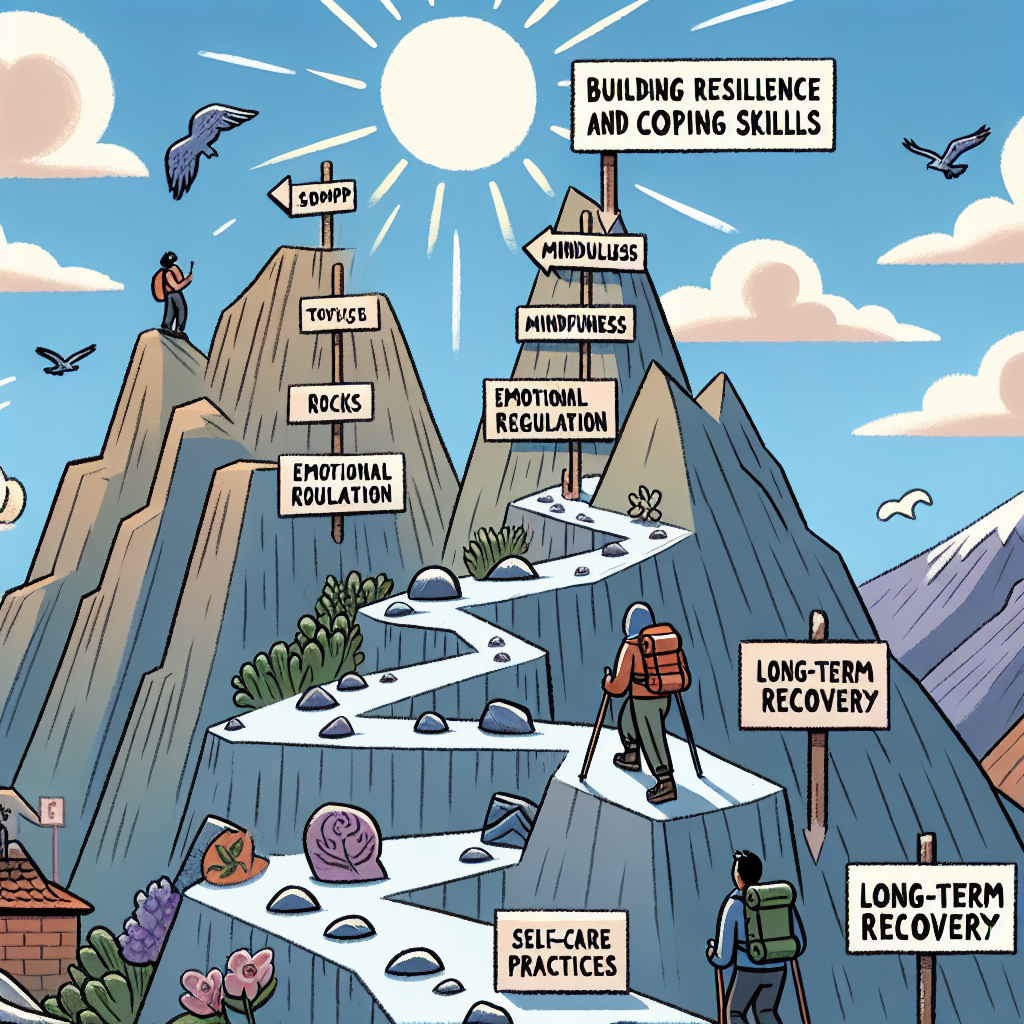-
Table of Contents

“Empower Your Journey: Building Resilience for Lifelong Recovery”
Introduction
Building resilience and coping skills for long-term recovery is essential for individuals navigating the challenges of overcoming addiction, trauma, or chronic illness. Resilience refers to the ability to adapt and thrive despite adversity, while coping skills are strategies and techniques that help manage stress and emotional pain. Together, these elements form a robust foundation for sustained recovery, enabling individuals to face setbacks with strength and maintain progress over time. Developing resilience involves fostering a positive mindset, building supportive relationships, and enhancing problem-solving abilities. Effective coping skills include mindfulness practices, healthy lifestyle choices, and seeking professional support when needed. By integrating these approaches, individuals can cultivate a resilient mindset and a comprehensive toolkit for enduring recovery, ultimately leading to a healthier, more fulfilling life.
Strategies for Building Emotional Resilience in Long-Term Recovery
Building resilience and coping skills for long-term recovery is a journey that requires dedication, self-awareness, and a proactive approach. Emotional resilience, the ability to adapt to stressful situations and bounce back from adversity, is a crucial component of this journey. Developing this resilience involves a combination of strategies that can help individuals navigate the complexities of recovery and maintain their well-being over time.
One of the foundational strategies for building emotional resilience is cultivating a strong support network. Surrounding oneself with positive, understanding, and supportive individuals can provide a sense of belonging and security. This network can include family, friends, support groups, or even professional counselors. Engaging with others who understand the challenges of recovery can offer encouragement, share valuable insights, and provide a sense of accountability. Moreover, these connections can serve as a reminder that one is not alone in their journey, fostering a sense of community and shared purpose.
In addition to building a support network, developing healthy coping mechanisms is essential for long-term recovery. Coping mechanisms are the tools and strategies individuals use to manage stress and emotional distress. Healthy coping mechanisms might include physical activities such as exercise, which can help reduce stress and improve mood through the release of endorphins. Mindfulness practices, such as meditation and deep-breathing exercises, can also be effective in promoting emotional stability and reducing anxiety. These practices encourage individuals to stay present and focused, helping them to manage their emotions more effectively.
Another important aspect of building emotional resilience is setting realistic goals and celebrating small victories. Recovery is a gradual process, and setting achievable milestones can provide a sense of direction and purpose. Celebrating these milestones, no matter how small, can boost self-esteem and motivation. It is important to recognize and appreciate the progress made, as this can reinforce positive behaviors and encourage continued effort.
Furthermore, developing a positive mindset is crucial for emotional resilience. This involves challenging negative thoughts and replacing them with more constructive and optimistic perspectives. Cognitive-behavioral techniques can be particularly useful in this regard, as they help individuals identify and reframe negative thought patterns. By focusing on strengths and past successes, individuals can build confidence in their ability to overcome future challenges.
Incorporating self-care into daily routines is another vital strategy for building emotional resilience. Self-care involves taking deliberate actions to maintain physical, emotional, and mental health. This can include activities such as getting adequate sleep, eating a balanced diet, and engaging in hobbies that bring joy and relaxation. Prioritizing self-care helps individuals recharge and maintain the energy needed to face the demands of recovery.
Lastly, seeking professional help when needed is an important component of building emotional resilience. Therapists, counselors, and other mental health professionals can provide valuable guidance and support. They can help individuals develop personalized strategies for managing stress, addressing underlying issues, and building resilience. Professional support can be particularly beneficial during challenging times, offering a safe space to explore emotions and develop effective coping skills.
In conclusion, building emotional resilience in long-term recovery involves a multifaceted approach that includes cultivating a support network, developing healthy coping mechanisms, setting realistic goals, fostering a positive mindset, incorporating self-care, and seeking professional help when needed. By embracing these strategies, individuals can enhance their ability to navigate the challenges of recovery and build a foundation for lasting well-being. The journey may be challenging, but with perseverance and the right tools, long-term recovery is not only possible but also a path to a more fulfilling and resilient life.
Effective Coping Skills to Sustain Long-Term Recovery
Building resilience and coping skills is essential for sustaining long-term recovery, as it equips individuals with the tools necessary to navigate the inevitable challenges and setbacks that life presents. The journey to recovery is often fraught with obstacles, but by developing effective coping strategies, individuals can maintain their progress and continue to thrive. One of the most fundamental aspects of building resilience is cultivating a strong support network. Surrounding oneself with positive influences, whether through family, friends, or support groups, provides a sense of belonging and encouragement. These connections offer a safe space to share experiences, seek advice, and receive emotional support, which can be invaluable during difficult times.
In addition to fostering supportive relationships, practicing mindfulness and self-awareness can significantly enhance one’s ability to cope with stress. Mindfulness techniques, such as meditation and deep-breathing exercises, help individuals stay present and focused, reducing anxiety and promoting a sense of calm. By becoming more attuned to their thoughts and emotions, individuals can better understand their triggers and develop healthier responses to stressors. This heightened self-awareness also enables them to recognize early warning signs of potential relapse, allowing for timely intervention and support.
Another crucial coping skill is the development of healthy routines and habits. Establishing a structured daily schedule that includes regular exercise, balanced nutrition, and adequate sleep can have a profound impact on overall well-being. Physical activity, in particular, has been shown to reduce stress, improve mood, and increase energy levels. By prioritizing self-care and maintaining a consistent routine, individuals can create a stable foundation that supports their recovery journey.
Moreover, setting realistic goals and celebrating small victories can boost motivation and reinforce a sense of accomplishment. Breaking down larger objectives into manageable steps makes them more attainable and less overwhelming. Each milestone achieved, no matter how small, serves as a reminder of progress and reinforces the belief in one’s ability to succeed. This positive reinforcement can be a powerful motivator, encouraging individuals to stay committed to their recovery.
In times of adversity, it is also important to practice self-compassion and forgiveness. Recovery is not a linear process, and setbacks are a natural part of the journey. Rather than dwelling on mistakes or perceived failures, individuals should focus on learning from these experiences and using them as opportunities for growth. By treating themselves with kindness and understanding, they can build resilience and maintain a positive outlook, even in the face of challenges.
Furthermore, engaging in creative outlets and hobbies can provide a healthy distraction and a sense of fulfillment. Activities such as painting, writing, or playing music offer a constructive way to express emotions and channel energy. These pursuits not only serve as a form of therapy but also contribute to a well-rounded and balanced life.
Lastly, seeking professional help when needed is a vital component of long-term recovery. Therapists, counselors, and other mental health professionals can provide valuable guidance and support, helping individuals develop personalized coping strategies and address underlying issues. Regular therapy sessions can offer a safe space to explore emotions, gain insights, and receive expert advice.
In conclusion, building resilience and effective coping skills is essential for sustaining long-term recovery. By fostering supportive relationships, practicing mindfulness, establishing healthy routines, setting realistic goals, practicing self-compassion, engaging in creative outlets, and seeking professional help, individuals can navigate the challenges of recovery with confidence and strength. These strategies not only promote emotional well-being but also empower individuals to lead fulfilling and resilient lives.
Q&A
1. **Question:** What are some effective strategies for building resilience during long-term recovery?
**Answer:** Effective strategies for building resilience during long-term recovery include developing a strong support network, practicing mindfulness and meditation, setting realistic goals, maintaining a healthy lifestyle through proper diet and exercise, and seeking professional counseling or therapy.
2. **Question:** How can coping skills be enhanced to support long-term recovery?
**Answer:** Coping skills can be enhanced by learning stress management techniques, engaging in regular physical activity, practicing relaxation exercises such as deep breathing or progressive muscle relaxation, participating in support groups, and developing problem-solving skills to handle challenges effectively.
Conclusion
Building resilience and coping skills for long-term recovery involves developing a strong support network, practicing self-care, setting realistic goals, and maintaining a positive mindset. It requires consistent effort to adapt to challenges, manage stress, and seek professional help when necessary. By fostering these skills, individuals can enhance their ability to recover from setbacks and sustain their well-being over time.



